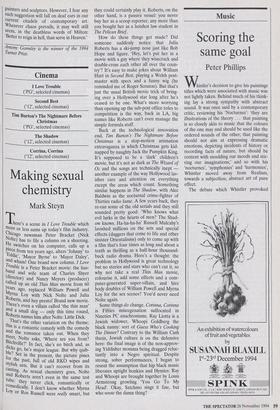Cinema
I Love Trouble (`PG', selected cinemas)
Second Best
(12', selected cinemas)
Tim Burton's The Nightmare Before Christmas (PG', selected cinemas) The Shadow (`12', selected cinemas)
Making sexual chemistry
Mark Steyn
here's a scene in I Love Trouble which more or less sums up today's film industry. Chicago newsman Peter Bracket (Nick Nolte) has to file a column on a shooting. He switches on his computer, calls up a Piece from ten years ago, alters 'Johnny' to Eddie', 'Mayor Byrne' to 'Mayor Daley', and wham! One brand new column. I Love Trouble is a Peter Bracket movie: the hus- band and wife team of Charles Shyer (director) and Nancy Meyers (producer) called up an old Thin Man movie from 60 Years ago, replaced William Powell and Myrna Loy with Nick Nolte and Julia Roberts, and hey presto! Brand new movie. There's even a villain called 'the thin man' and a small dog — only this time round, Roberts names him after Nolte: Little Dick. That's the other variation on the theme: this is a romantic comedy with the comedy and the romance taken out. When they meet, Nolte asks, 'Where are you from? Eitchville?' In fact, she's no bitch and, as dicks go, he's major league. But why quib- ble? Set in the present, the picture pines for .the past, full of old RKO wipes and stylish sets. But it can't recover from its casting. As sexual chemistry goes, Nolte and Roberts aren't even in the same test tube: they never click, romantically or eomedically. I don't know whether Myrna Loy or Ros Russell were really smart, but they could certainly play it. Roberts, on the other hand, is a passive vessel: you never buy her as a scoop reporter, any more than you bought her as a hotshot law student in The Pelican Brief.
How do these things get made? Did someone suddenly notice that Julia Roberts has a ski-jump nose just like Bob Hope and figure, 'Hey, let's put her in a movie with a guy where they wisecrack and double-cross each other all over the coun- try'? It's easy to make jokes about William Hurt in Second Best, playing a Welsh post- master with specs and a funny wig (he reminded me of Roger Scruton). But that's just the usual British movie trick of bring- ing over a Hollywood star long after he's ceased to be one. What's more worrying than opening up the sub-post office roles to competition is the way, back in LA, big names like Roberts can't even manage the simple formula stuff.
Back at the technological innovation end, Tim Burton's The Nightmare Before Christmas is a stop-motion animation extravaganza in which Christmas gets kid- napped by naughty Jack the Pumpkin King. It's supposed to be a 'dark' children's movie, but it's not as dark as The Wizard of Oz and the songs are technically inept another example of the way Hollywood lav- ishes care and attention on everything except the areas which count. Something similar happens in The Shadow, with Alec Baldwin as the nocturnal crime-fighter of Thirties radio fame. A few years back, they re-ran some of the old serials and they still sounded pretty good: 'Who knows what evil lurks in the hearts of men? The Shad- ow knows. Ha-ha-ha-ha' Russell Mulcahy's lavished millions on the sets and special effects (daggers that come to life and other sinister Orientalisms) only to come up with a film that's four times as long and about a tenth as thrilling as a half-hour thousand- buck radio drama. Here's a thought: the problem in Hollywood is great technology but no stories and stars who can't cut it, so why not take a real Thin Man movie, colourise it, add some effects and a com- puter-generated super-villain, and hire body doubles of William Powell and Myrna Loy for the sex scenes? You'd never need Nolte again.
Some things do change. Corinna, Corinna is Fifties miscegenation suffocated in Nineties PC anachronisms. Ray Liotta is a Jewish widower, Whoopi Goldberg the black nanny: sort of Guess Who's Cooking The Dinner? Contrary to the William Cash thesis, Jewish culture is on the defensive here: the final image is of the non-approv- ing Yiddisher momma being dragged reluc- tantly into a Negro spiritual. Despite strong, sober performances, I began to resent the assumption that hip black music liberates uptight honkies and Hymies: Ray and Whoopi are brought together by Louis Armstrong growling 'You Go To My Head'. Okay, Satchmo sings it fine, but who wrote the damn thing?










































































 Previous page
Previous page